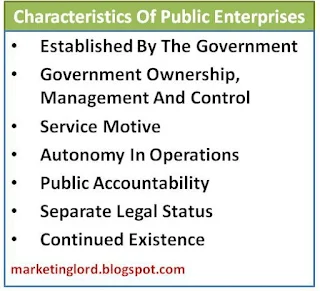Introduction
Public enterprises are business organizations established and run by the government. The main objective of public enterprise is to provide essential services to the public rather than making profit. BBC, U.S Postal Service, Air India etc. are some examples of public enterprises.
Characteristics Of Public Enterprises
The main characteristics of public enterprises can be pointed out as follows:
1. Business enterprise of government
Public enterprises are business enterprises established by government. They are engaged in manufacturing, marketing , public utilities and services. Government makes budget allocations to public enterprises. They are financed by state.
2. Government ownership, management and control
Public enterprises are owned by government. Their share capital is financed by government government ranging from 51% to 100%. They get foreign assistance through government. The top level management of public enterprises is appointed by government. This consists of board of directors and chief executive officer.
3. Service motive
Generally, public enterprises have service motive. They provide essential goods and services to public at reasonable price. They are guided by social welfare motive. They also generate profit and pay tax to the government.
4. Autonomy
Public enterprises enjoy autonomy or semi-autonomy in operations. They function as companies and corporations. The government does not interfere in their day to day functioning. So, autonomy is a notable characteristic of public enterprises.
5. Public accountability
Public enterprises have public accountability. They are accountable to the parliament for their performance. The auditor general reports to the parliament about the performance of public enterprises. They are also accountable to general public through government.
Also Read:
6. Separate legal status
Public enterprises have separate legal status. They are established by a special act of Parliament, or Company Act or other acts. Public enterprises can enter into contract in their own name. They can sue and can be sued in courts of law.
7. Continued existence
Continuity is another characteristic of public enterprises because they have continued existence and stability. They are created by law and can be dissolved only by law. Changes in shareholders, management and employees do not affect the existence of public enterprises.
Key Features Of Public Enterprises In Short
* They are fully or partially owned and controlled by the state
* They have separate legal identity
* They aim to provide essential services to the public
* They do not focus on profit
* They are accountable to public







